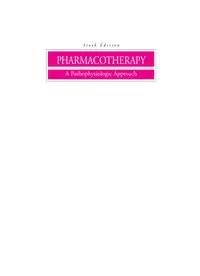
pharmacotherapy PDF
Preview pharmacotherapy
P1: FCH GB109-FM April 7, 2005 18:17 S i x t h E d i t i o n PHARMACOTHERAPY A Pathophysiologic Approach i P1: FCH GB109-FM April 7, 2005 18:17 Notice Medicine is an ever-changing science. As new research and clinical experience broaden our knowledge, changes in treatment and drug therapy are required. The editors and the publisher of this work have checked with sources believed to be reliable in their efforts to provide information that is complete and generally in accord with the standards accepted at the time of publication. However, in view of the possibility of human error or changes in medical sciences, neither the editors nor the publisher nor any other party who has been involved in the preparation or publication of this work warrants that the information contained herein is in every respect accurate or complete, and they disclaim all responsibility for any errors or omissions or for the results obtained from use of the information contained in this work. Readers are encouraged to confirm the information contained herein with other sources. For example and in particular, readers are advised to check the product information sheet included in the package of each drug they plan to administer to be certain that the information contained in this work is accurate and that changes have not been made in the recommended dose or in the contraindications for administration. This recommendation is of particular importance in connection with new or infrequently used drugs. ii P1: FCH GB109-FM April 7, 2005 18:17 S i x t h E d i t i o n PHARMACOTHERAPY A Pathophysiologic Approach Editors Joseph T. DiPiro, PharmD, FCCP Professor and Executive Dean, South Carolina College of Pharmacy, University of South Carolina, Columbia, and Medical University of South Carolina, Charleston Robert L. Talbert, PharmD, FCCP, BCPS Professor, College of Pharmacy, University of Texas at Austin; Professor, Departments of Medicine and Pharmacology, University of Texas Health Science Center at San Antonio, Texas Gary C. Yee, PharmD, FCCP Professor and Chair, Department of Pharmacy Practice, College of Pharmacy, University of Nebraska Medical Center, Omaha, Nebraska Gary R. Matzke, PharmD, FCP, FCCP Professor, Department of Pharmacy and Therapeutics, School of Pharmacy, Renal-Electrolyte Division, School of Medicine, University of Pittsburgh, Pittsburgh, Pennsylvania Barbara G. Wells, PharmD, FASHP, FCCP, BCPP Dean and Professor, School of Pharmacy, The University of Mississippi, University, Mississippi L. Michael Posey, BS Pharm President, PENS Pharmacy Editorial and News Services, Athens, Georgia MCGRAW-HILL Medical Publishing Division New York Chicago San Francisco Lisbon London Madrid Mexico City Milan New Delhi San Juan Seoul Singapore Sydney Toronto iii P1: FCH GB109-FM April 7, 2005 18:17 Pharmacotherapy: A Pathophysiologic Approach, Sixth Edition Copyright C⃝ 2005, 2002 by The McGraw-Hill Companies, Inc. All rights reserved. Printed in the United States of America. Except as permitted under the United States Copyright Act of 1976, no part of this publication may be reproduced or distributed in any form or by any means, or stored in a database or retrieval system, without the prior written permission of the publisher. Previous editions copyright C⃝ 1999, 1997, 1993 by Appleton & Lange. 1 2 3 4 5 6 7 8 9 0 DOWDOW 0 9 8 7 6 5 Set ISBN 0-07-141613-7 Book p/n 0-07-146392-5 E-book download access card p/n 0-07-146393-3 and sticker p/n 0-07-146394-1 E-book ISBN 0-07-146390-9 This book is sold with codes for access to an Online Learning Center and an e-book version of the text. This book is not returnable unless the shrink-wrap and the scratch-off coating on the codes are intact. Please tell the authors and publisher what you think of this book by sending your comments to
